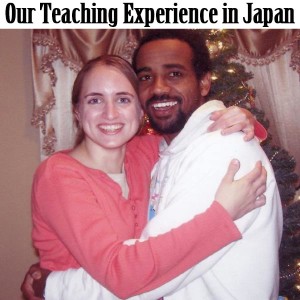 Introduction
Introduction
Our names are Allen and Laura Thompson. I (Laura) was born in Enid, Oklahoma, and my husband Allen was born in Mito, Ethiopia. Mike and Annette Thompson adopted Allen (Ethiopian name “Hassen”) when he was 14 years old. We are honored that Annette asked us to contribute our experience with you on her new website to help prepare people to be English teachers abroad. We met at Oklahoma Christian University. We graduated, got married, and then prepared for life in Japan, which is where we applied to be assistant English language teachers (ALTs).
For those of you who think you cannot teach English in a foreign country, just remember my husband Allen. English is his fourth language, and he taught English in Japan for three years. Our boss was the Mito City government. So, we technically worked for the city. All the other foreign English teachers we knew in Japan worked for a public or private company. We were in a slightly different situation working for the city, but we still had a lot of similar experiences being foreign English teachers living and working in a foreign culture.
Our Advice from Our Experience
As a foreign English teacher, and usually in the position of assistant English teacher, there are some qualities that are pertinent to excelling at this job and at living your life in the foreign country.
1) You must be patient with yourself and others,
2) you must be flexible with your time and ideas,
3) you must be teachable instead of unreachable,
4) you must be willing to learn the language of that country (doesn’t have to be perfect, as long as they can see you are trying),
5) you must be willing to laugh in the face of difficulties and see it as an adventure,
6) and you must be willing to be immersed into the culture and appreciate it for what it is.
Focusing on positive thoughts and seeing all the challenges as a way to grow and learn will push you through the hard times and allow you to do exceedingly more than you even imagined you could do.
The #1 helpful advice we received before we left for Japan was this, “The less you ask the ‘why’ question, the better your life will be.” And this turned out to be so true for us. We saw how the things that made sense in our own cultures did not necessarily make sense or apply to life and culture in Japan. Sometimes we would find ourselves in a state of confusion and wonder “why” this had to be so difficult. Well, then we realized we were in a pointless argument. It was just better to accept things the way they were and not struggle against it. An example of this in Japan is indirect communication. We are used to direct communication in America and Ethiopia, but in Japan, it is considered impolite to communicate in that way.
For example, Allen had a situation where the vice-principal of his school talked to our head boss about something we considered small and that he could have just talked to Allen personally about. It had to do with Allen not coming in with the students right when the bell rang for recess to be over. Allen remained in the field playing soccer with some kids and was a little late coming back inside. Being on time is very important in the Japanese culture. So, the vice-principal took the problem to our head boss. That boss talked to Allen about it. Allen chose to do his part by apologizing and coming in from recess on time from that point forward. He could have chosen to be upset and take offense to the way the situation was handled. But he chose to be humble and just do his part to fix the problem and move on with life.
How to Excel at this Job
It is important to keep yourself busy on and off the job. On the job, find what makes the other teachers and principals happy. Do they appreciate you taking the initiative to plan lessons or make materials, or would they rather do most of that while you spend more time being involved in the students’ lives through their after school clubs and activities? Find out what the school wants you to do with your time, and do that to the best of your ability. Be willing to learn from them.
Off the job, in your personal time, it’s so important for you to find the community of people that fits you and your needs. For us, it was three different communities: church, other Ethiopian and American foreigners, and Japanese friends. Don’t be a loner! That is the number one problem for foreigners in Japan. This is partly because it is hard to break through the barrier and make close relationships with Japanese people. But that is all the more reason to find community and not let yourself be alone. Find a community that is going to nurture and help you along.
Because of our involvement with the Mito Church of Christ and the friends we made, we were able to be part of the homeless ministry, do relief work after the tsunami and earthquake, make connections and become friends with the Ethiopian ambassador and his family, and enjoy deep relationships with wonderful Japanese people. It took a lot of effort on our part, but it was so worth it. And our third year there was the most rewarding, because that’s when our deepest relationships were formed and it seemed like all our efforts led up to that year.
Saying goodbye to everyone was very bittersweet, but it was beautiful and meaningful too. And we carry those good memories in our hearts and minds forever now. Life has taken us other places now, but our time in Japan will forever be part of us. Now we have lifelong friends and a deeper understanding and appreciation of other cultures.
If you have any questions or would like to talk with us about our experience in person, please skype with us at allenandlaurathompson or Facebook us at Allen Hassen Shifa Thompson. Allen’s phone number is 405-604-1476.
